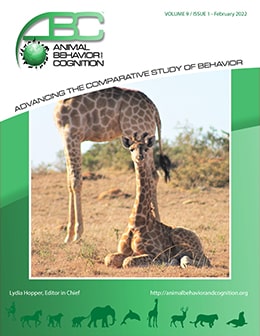Vol 9, Issue 1, February 2022
Prosocial Decision Making in an Operant Box Paradigm Promotes Visual Communication and Complex Behavioral Sequences in Adolescent Rat Dyads
Citation
Charron, V., Talbot, J., & Plamondon, H. (2022). Prosocial decision making in an operant box paradigm promotes visual communication and complex behavioral sequences in adolescent rat dyads. Animal Behavior and Cognition, 9(1), 53-71. https://doi.org/10.26451/abc.09.01.05.2022
Abstract
The adolescence period is marked by intense social play behavior in rats, shown to influence social, cognitive, and emotional processes. The goal of this study was to assess the ability of adolescent rats to display prosocial behaviors through a sharing task and to learn prosociality from vicarious observation. The paradigm involved a pretraining phase, using a two-chamber operant box with two reward differentiated levers on the actor side, providing one and two sucrose pellets respectively upon pressing. Dyads where actors were not exposed to pretraining session acted as controls. The prosocial phase ensued, where an easy lever pressed dispensed one pellet while a hard lever pressed dispensed one reward to both the actor and observer in the adjacent chamber. Actor and observer rats then switched roles enabling vicarious learning assessment. Findings revealed pretraining to be critical for behavior and task contingency in adolescent rats. Complex behavioral sequences marked by increased visual communication between dyads was observed. Despite the diversity of behaviors, observer rats failed to learn prosocial behaviors. This study shows pretraining to act as a key element promoting behavioral interactions; the thorough behavioral analysis performed highlights the ability for adolescent rats to display a richness of behaviors when paired with a congener. Another interesting finding was the ability for rats to learn prosocial behaviors, but the inability to learn such behaviors by observation. These findings call for further studies to understand prosocial behaviors in rodents and their ability to learn such behaviors from a congener.
Keywords
Social behavior, Pretraining, Operant conditioning, Adolescence, Rat
